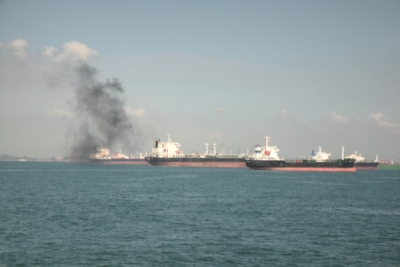TCC partners university to develop new ship emissions reduction method

Hong Kong shipowner Tai Chong Cheang (TCC) and the University of Southern California’s Viterbi School of Engineering have achieved a research breakthrough for cutting harmful emissions from merchant ships.
The research was conducted as part of a research program focused on improving marine diesel consumption efficiency and the reduction of exhaust gases via the application of nanosecond pulsed generation techonology.
Initial testing shows cuts in nitrogen oxide (NOx) emissions by 90% and particulate matter (PM) by up to 75%.
The dramatic improvement in efficiency was achieved by utilising the radically different and more cost effective approach of nano-pulse power, compared to the standard scrubbers, used on vessels that require training for crews and maintenance.
Yannis C. Yortsos, dean of the USC Viterbi School of Engineering, said: “The application of this new technology, whether at the point of the exhaust gas flow, and/or during the combustion engine itself, promises to substantially alter the way commercial shipping operates both in terms of diesel engine efficiencies and in the reduction of emissions, for the benefit of the environment.”
The emissions research project was initiated and funded by TCC under the leadership of Kenneth Koo, ceo of TCC, as a corporate social responsibility initiative.
Koo commented: “We believe that this game-changing solution will allow owners and managers to unshackle themselves from the present constraint of slow steaming as the only means to realize lower fuel consumption. I believe this research and its culmination announced today could have fundamental long term implications for the global shipping industry.”
Koo added: “While game-changing solutions through alternative energy consumption, especially with LNG, are likely the long term future of the shipping industry, the infrastructure developments for LNG being in their infancy and the prospects of retrofitting present ships with LNG machinery system very unlikely at best, we must research solutions that addresses present designs to tackle present challenges.”
He also argued that slow steaming, or super slow steaming, modes of navigation to cut fuel consumption are “just band-aid solutions with the sole commercial objective to cut costs.”
Koo noted that marine diesel engines were not designed to operate at very low RPM and power output and he further argued the industry must go back to the basics by addressing combustion efficiency thus enabling solutions to be demonstrated to reduce, reverse and recover ship-sourced emissions before they are emitted.
HEADLINES
- Do shipping markets want Biden or Trump for the win?
- All 18 crew safe after fire on Japanese-owned tanker off Singapore
- Singapore launching $44m co-investment initiative for maritime tech start-ups
- Cosco debuts Global Shipping Industry Chain Cooperation Initiative
- US warns of more shipping sanctions
- China continues seaport consolidation as Dalian offer goes unconditional